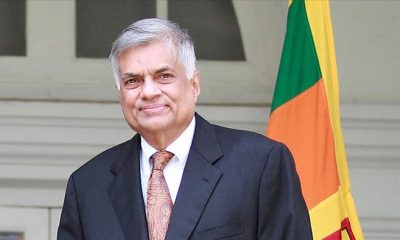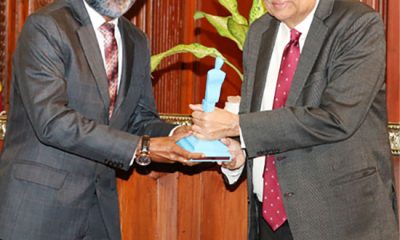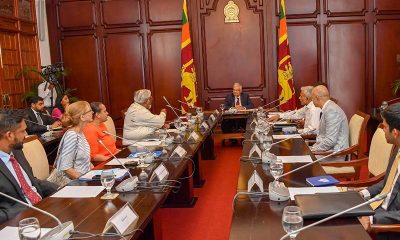FEATURES
Govt.’s choice of elections

President Wickremesinghe
by Jehan Perera
The discussions that President Ranil Wickremesinghe has commenced with the Tamil parties in the north and east are being seen as a possible precursor to elections in those two provinces. The talks are scheduled over three days. The president has an interest in holding some form of elections as the government’s moral legitimacy has been undermined by its refusal to conduct the local government elections on schedule. The president would be conscious that the manner of his election, by parliament and not by the people, creates an issue of moral legitimacy that needs to be addressed. The grounds for the repeated postponement of local government elections, that the money is either unavailable or better spent elsewhere, is clearly unacceptable from a democratic or rule of law perspective.
There is speculation that provincial elections will take place prior to presidential elections which are expected to take place by the end of the year and this is the reason for the president to engage in discussions with the Tamil parties. One of the matters taken up for discussion has been the construction of several Buddhist temples in areas in which there are few if any Buddhists currently living which is causing much heartburn to Tamils and Muslims living there. Ancient Buddhist ruins are being re-discovered in different parts of the north and east by the Archaeology Department. At the same time there has been destruction of existing Hindu shrines, both ancient and more recent, by unidentified groups which has led to a suspicion that there is a government hand on account of the large presence of security forces in those areas.
President Wickremesinghe has moved swiftly to address the problems by discussing these matters with officials from the Archaeology Department. Upon inquiry, they have admitted that their archaeological work in the north and east is being funded by Buddhist monks and not by the government, as the government has no money at the present time. The Director General of Archaeological Department told the President that the priority has been given to the north and east, because it was neglected for 30 years and mostly they do not get government money, but from different funding agencies. The official said sometimes the Archaeological Department is given funds by monks. The president had expressed the view that archaeological sites belonged to the country and it would be the state that looked after them.
INCLUSIVE APPROACH
The Buddhist heritage of Sri Lanka is a deeply held sentiment within the country’s ethnic and religious majority, and is often reflected in the state itself. The constitution itself gives the foremost place to Buddhism, although it gives other religions the right to proselytize and to practice. The official logo of the Archaeology Department is an image of the Stupa, which is the most visible component of the country’s Buddhist heritage. The special place for Buddhism in Sri Lanka has been exploited for political purposes by politicians who claim that either the religion or race or both together are at risk, and that if they are voted into power they will protect them and the country. Many of them seem to survive by articulating conspiracy theories to consolidate their nationalistic viewpoints. Only a handful of national level politicians have been willing to counter this parochial nationalism. The current president is one of them.
During the period of the Aragalaya, the venality of the political leaders in power at that time became exposed with the country’s economic collapse. It led to youthful protestors, many from the universities, to voice out that they would not be tricked anymore by such claims and that regardless of race or religion everyone was an equal citizen. It is ironic that after ascending to the pinnacle of the presidency as a result of the Aragalaya that drove out his predecessor, that the president should have moved to silence the youthful voice that called for equality, greater justice and accountability for economic crimes. It would have been better if he had taken the challenge of harnessing their energy and idealism to the great task of building a Sri Lankan nation that is united to develop the country and its economy without robbing it at every possible turn.
The straightforward manner in which the president addressed the officials of the Archaeology Department is indicative of a value system in which the state is the neutral arbiter of its ethnic and religious plurality. His willingness to speak openly and clearly and to seek to guide the state institutions along an inclusive path would be much appreciated by the ethnic and religious minorities. This rational quality of the president was also seen a few months ago when he advocated the implementation of the 13th Amendment to the constitution as mandated by the constitution. Unfortunately, these good intentions have remained in the realm of words only and not yet been translated into implementation on the ground.
BLEAK PROSPECTS
The main feature of the 13th Amendment is the establishment of a system of devolved power to elected provincial councils that would empower the people of each province to elect their leaders who would govern them in specified subject areas. However, provincial council elections have not been held for over four years and they are non-functional as institutions of devolved power. Instead they are ruled by governors appointed by the president which has made a mockery of the devolution of power. The provincial councils have become administrative bodies run by a presidentially appointed governor who can act, and do act arbitrarily, without consulting the people of the province. It is necessary to revise the provincial council law that gives more powers to the Governors beyond the elected representatives.
Unfortunately, the origins of the provincial council system in the Indo-Lanka Peace Accord in 1987, has caused it to be viewed with a measure of skepticism by the Sinhalese majority as an Indian imposition that would weaken the Sri Lankan state. The Indo-Lanka Peace Accord was controversial when it was signed and continues to be downplayed in the public life of the country. According to it, India agreed to disarm the LTTE and Sri Lanka agreed to establish provincial councils on the Indian model. Neither happened in full measure. Today the non-implementation of the provincial council system has turned them into white elephants as the system has not been implemented as it should be.
The problem with holding provincial council elections starting with the Northern and Eastern provinces is that it can fan Sinhalese apprehensions which will be exploited by parochial nationalist groups who are currently displaced from the centre of power. They will have no qualms claiming that the president is favouring the Tamils, paving the way for the domination of the north and east by India, or some other scare mongering claim. If provincial council elections are to be held, they need to be held in the entire country and for all the provinces at one time. In such a situation the government will face the same dilemma it faced in deciding to postpone the local government elections. The prospects for elections in the near future continue to be bleak.




